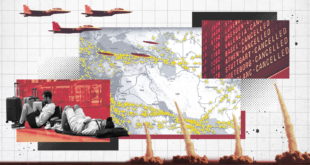 TEHRAN (FNA)- Iran and India sought to inject new momentum in bilateral relations as they vowed to enhance trade and business ties and signed two agreements and four Memoranda of Understanding in the same regard.
TEHRAN (FNA)- Iran and India sought to inject new momentum in bilateral relations as they vowed to enhance trade and business ties and signed two agreements and four Memoranda of Understanding in the same regard.
New Delhi also reiterated that the Indo-US nuclear deal was not at the cost of a multi-billion-dollar pipeline which is due to take Iran’s rich gas reserves to the energy-hungry India via Pakistan.
Iran, for its part, invited Indian companies to explore oil and gas in the hydro-carbon rich Persian Gulf as the two countries decided to improve banking and insurance linkages to encourage two-way investments.
Wrapping up his three-day official visit to Iran, External Affairs Minister Pranab Mukherjee said the nuclear deal with the US was not at the cost of the Iran-Pakistan-India gas pipeline as atomic power was one of the country’s sources to ensure the fast growing economy’s energy security.
Nuclear power “is one source of energy, the other important source is the Iran-Pakistan-India (IPI) gas pipeline. One is not exclusive to the other,” Mukherjee said at a joint press conference with Iranian Economic Minister Shamseddin Hosseini after the two-day joint commission meeting set up by the two countries.
Mukherjee asserted that the nuclear deal with the US will have no impact on the IPI gas pipeline.
“India’s energy requirement is quite substantial and we have to locate various sources of energy, including civil nuclear cooperation with countries like the US, France and Russia or any other country willing to cooperate with us,” he said.
Mukherjee, who met Iranian President Mahmoud Ahmadinejad and other senior leaders, said he got positive indications to expand the political relationship between the two countries.
Asked about the implementation of the Liquefied Natural Gas (LNG) project, Iranian Economic Minister Shamseddin Hosseini said there are lots of financial and technical issues that have to be considered.
“All negotiations have not been finalized. We will sign it when all negotiations are completed,” he said, adding that the magnitude of the project is such the deal has not been signed.
Iran and India signed the LNG project in 2005 but Tehran had raised issues of pricing of the gas citing rise in global prices leading to non-implementation of the deal.
Mukherjee said cooperation between India and Iran is important for stability in the region.
“Stability in the region is important for global peace,” he said.
The two sides signed an Extradition Treaty and a Mutual Legal Assistance Treaty, four Memoranda of Understanding, including a working plan on agriculture and sister port arrangement between the Shahid Rashid Port in Iran and Jawaharlal Nehru Port Trust near Mumbai.
The two sides also finalized the text of the Bilateral Investment Promotion and Protection Agreement (BIPPA.) which Mukherjee hoped will be signed soon.
During the Joint Commission meeting, the two sides identified specific areas for cooperation like trade and investment, mining, energy, science and technology, railways and banking.
Iran and India also felt that economic and trade relations were not up to the potential and there was “abundant” scope for enhancing this.
“In the field of energy, there was an agreement to use the capabilities and capacities of Indian corporations in the exploration of oil and gas in Iran and take necessary measures accordingly,” Hosseini said.
Yet, the IPI gas project has remained the most important issue for both sides. Iran and Pakistan initiated a Gas Sales Purchase Agreement earlier this year. Indian and Pakistani officials also announced earlier this year that they had resolved almost all bilateral issues including transit fee which saw New Delhi boycotting IPI pipeline talks for about a year.
India has more or less agreed to give Pakistan a transit fee of $200 million per year, which is equivalent to $0.60 per million British thermal unit for allowing passage of the pipeline through that country.
India and Pakistan finally agreed in February 2007 to pay Iran $4.93 per million British thermal units ($4.67/GJ) but some details relating to price adjustment remained open to further negotiation. There was a breakthrough in the talks in April 2008 when Iranian President Mahmoud Ahmadinejad visited Pakistan and India.
According to the project proposal, the pipeline will begin from Iran’s Assalouyeh Energy Zone in the south and stretch over 1,100 km through Iran. In Pakistan, it will pass through Baluchistan and Sindh but officials now say the route may be changed if China agrees to the project.
The gas will be supplied from the South Pars field. The initial capacity of the pipeline will be 22 billion cubic meter of natural gas per annum, which is expected to be later raised to 55 billion cubic meter. It is expected to cost $7.4 billion.
According to Indian ministry sources, the IPI gas pipeline is quite crucial for New Delhi as after signing of the agreement, 60 million standard cubic meters per day (mmscmd) of gas is expected to be supplied in phase-I, which will be shared equally between India and Pakistan.
In phase-II, 90 mmscmd of gas will be supplied to India and Pakistan. So far six meetings of the trilateral joint working group (JWG) of the participating countries have been held with the last meeting being held in New Delhi on June 28-29, 2007.
India, Asia’s third-largest economy, can produce only half the gas it needs to generate electricity, causing blackouts and curbing economic growth. Demand may more than double to 400 million cubic meters a day by 2025 if the economy grows at the projected rate of 7 to 8 percent a year, according to the Indian oil ministry.
Iran plans to start exporting gas to Pakistan in 2011. Iran has completed half the pipeline, which can carry 110 million cubic meters of gas a day, National Iranian Gas Company (NIOC) said in April. India uses about 108 million cubic meters of gas a day, according to a BP Plc report.
 Eurasia Press & News
Eurasia Press & News


